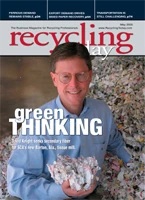Copper Continues to Surge
Copper markets continue to strengthen, with futures in the middle of April reaching a record-high price on the London Metal Exchange. According to various industry sources, continued purchases from China are propelling stronger copper markets. China consumes about 25 percent of the world’s copper supply every year.
According to a report by Reuters, the price of copper has soared by more than 200 percent from a cyclical low of around $1,364 per metric ton in October of 2001 to a recent figure of around $3,320 per metric ton.
While copper continues to climb, a number of more bearish industry watchers feel that copper markets have far exceeded their fundamentals. Further, while China has been the key driving force for the copper market (including scrap copper), some speculate that China may start to rein in some of its purchasing of the commodity, which could drive down prices.
Other nonferrous metals also continue to enjoy stronger pricing, though again there is some caution creeping into statements by metals traders. Nickel and aluminum have seen stronger pricing throughout the past several quarters.
Nickel has been able to remain fairly strong, with demand solid across many markets. Prices have remained at a fairly high level, though there doesn’t appear to be a significant amount of extra nickel available.
The strength in nonferrous metals markets is not limited to just the United States. European markets also have been seeing continued improvements. In the most recent "World Mirror," Marc Natan, president of the Bureau of International Recycling’s Nonferrous Division, notes that copper in Europe continues to strengthen, while aluminum has seen its price reach $2,030 per metric ton March 11, representing a 10-year high.
He adds that several other nonferrous grades are following in the path of copper and aluminum with stronger price and demand.
While markets remain steady to strong, some of the more bearish speculators feel that some of the commodity exchanges, notably the London Metal Exchange, and the Shanghai and Comex warehouses, are carrying only a few days of consumption on hand. This, Natan notes, "prompts speculation about the actual level of stocks lying outside of these warehouses."
Another consideration that is gaining some advocates is the potential slowdown in the world economy. While 2004 was a strong year for the global economy, some worry that a modest slowdown in the economy will have a negative impact on many nonferrous metals.
In other nonferrous news, Aleris International Inc. has announced that Jimmy Chen has joined the company as vice president and general manager, Asia Pacific. He will be based in Hong Kong and will be responsible for developing and implementing growth initiatives for all Aleris business segments in the Asia Pacific region.
"Chen brings to Aleris 25 years of cross-cultural business leadership, general management, M&A and infrastructure growth experience in commodity, specialty chemicals and agricultural industries," Steven Demetriou, chairman and CEO of Aleris, says. "He will be a strong addition to our global management team."(Additional news about nonferrous scrap, including breaking news and consuming industry reports, is available online at www.RecyclingToday.com.)
EPA, SPECTRO REACH AGREEMENT
The U.S. Environmental Protection Agency Region 5 has reached an agreement with Spectro Alloys Corp. on alleged clean-air violations at the company’s aluminum recovery plant in Rosemount, Minn. The EPA has assessed a $49,000 penalty, and Spectro agreed to complete a $150,000 environmental project.
"For its environmental project, Spectro will install a concrete or asphalt surface on almost 40,000 square feet of dusty limestone roadways at its plant to protect the health of its neighbors," says Bharat Mathur, acting regional administrator.
Companies that violate the Clean Air Act may voluntarily propose environmental projects as part of their settlements. EPA may reduce monetary penalties if it believes a project will cut pollution significantly and goes beyond what is required by EPA regulations.
The agreement resolves an EPA administrative complaint filed last September alleging that, among other things, Spectro emitted excessive amounts of hazardous dioxins, furans and hydrochloric acid from its furnaces and scrap dryers.
Spectro has made operational changes and has done testing that shows it is now in compliance with regulations covering emissions from its equipment. It has also fixed other problems identified in the complaint, including data recording device failures.

Explore the May 2005 Issue
Check out more from this issue and find your next story to read.
Latest from Recycling Today
- Nucor receives West Virginia funding assist
- Ferrous market ends 2024 in familiar rut
- Aqua Metals secures $1.5M loan, reports operational strides
- AF&PA urges veto of NY bill
- Aluminum Association includes recycling among 2025 policy priorities
- AISI applauds waterways spending bill
- Lux Research questions hydrogen’s transportation role
- Sonoco selling thermoformed, flexible packaging business to Toppan for $1.8B





